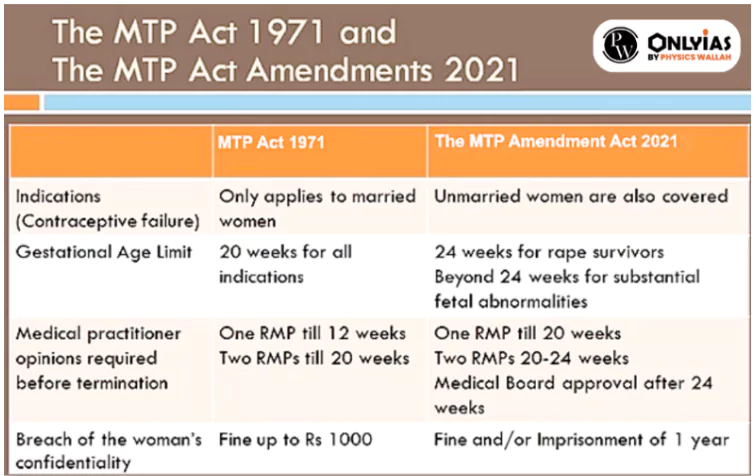Context
Recently, the Supreme Court rejected a prayer to allow abortion of a 27-week pregnancy while observing that the fetus too has a right to live.
About the Case
- The petitioner is a 20-year-old single woman and had approached the SC after the Delhi High Court turned down her prayer on May 3.
- The HC referred to a expert report by panel of doctors of All India Institute of Medical Sciences (AIIMS) set up on its direction and said it “shows that there is no congenital abnormality in the foetus nor is there any danger to the mother to carry on with the pregnancy which will mandate termination of the foetus”.
- It added that foeticide would neither be ethical nor legally permissible.
|
Abortion of 27-Week Pregnancy
- Last month, an SC bench presided by Chief Justice of India had allowed a 14-year-old minor rape victim to terminate her 27-28 week pregnancy.
- The court, however, recalled the order two weeks later as her mother who initially was for the abortion, expressed doubts over the likely impact of the procedure on her daughter’s health and opted to have a normal delivery.
- The bench also said that a “medical board, in forming its opinion on the termination of pregnancies must also evaluate the physical and emotional wellbeing of the person in terms of the judgment”.
Enroll now for UPSC Online Course
Abortion Law in India
- The Medical Termination of Pregnancy Act, 1971 (MTP Act): It allows the termination of pregnancy under the following circumstances,
 Upto 20 Weeks: Regular Termination of Pregnancy is allowed on the advice of one doctor.
Upto 20 Weeks: Regular Termination of Pregnancy is allowed on the advice of one doctor.- Between 20-24 Weeks: Abortion is allowed but as an exception only under certain categories, after two registered medical practitioners have evaluated the right to seek termination.
- Section 3B of the Rules under the MTP Act: It lists seven categories of forced pregnancies,
- Survivors of sexual assault or rape or incest; Minors; Change of marital status during the ongoing pregnancy (widowhood and divorce); Women with physical disabilities; Mentally ill women including mental retardation; The foetal malformation; Women with pregnancy in humanitarian settings or disaster or emergency situations.
- After 24 Weeks: A medical board needs to be set up in approved facilities, which will take the decision to allow or deny termination but only if there is substantial fetal abnormality.
- The MTP Amendment Act, 2021: It permits abortion from 20 to 24 weeks of gestation for specific cases like rape survivors, with approval from two doctors.
- It sets up state level Medical Boards to decide if a pregnancy may be terminated after 24 weeks in cases of substantial fetal abnormalities.
The Question of ‘foetal viability’ in Abortion
- It is the time after which a fetus can survive outside the womb. Foetal viability is usually pegged at 23-24 weeks (6 months).
- Origin: The idea originated with the landmark 1973 US Supreme Court verdict in ‘Roe v Wade’ whereby abortion was made a constitutional right up to the point of foetal viability.
- India’s Case: The question of foetal viability (Right of an unborn child) vs Right of Abortion has arised in a case whereby,
- A two-judge all-woman Supreme Court bench disagreed on allowing a 27-year-old married woman to terminate her 26-week pregnancy after her fetal viability report was presented to the court.
A Constitutional Right
The Constitution of India guarantees the right to life and personal liberty to all citizens under Article 21.
- This right has been interpreted by the Supreme Court of India to include the right to reproductive choice and autonomy for women.
- In Justice K.S. Puttaswamy (Retd.) vs. the Union Of India Case, 2017, the Supreme court recognized the constitutional right of women to make reproductive choices, as a part of personal liberty under Article 21 of the Indian Constitution.
Enroll now for UPSC Online Classes
![]() 16 May 2024
16 May 2024
 Upto 20 Weeks: Regular Termination of Pregnancy is allowed on the advice of one doctor.
Upto 20 Weeks: Regular Termination of Pregnancy is allowed on the advice of one doctor.